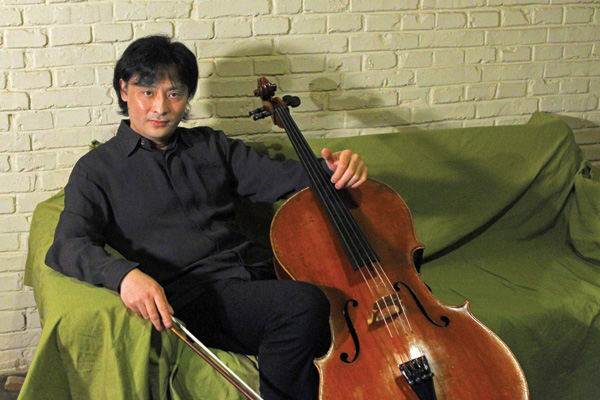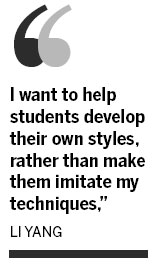
 |
|
Li Yang says playing cello is like picking up a pen and writing. [Photo by Zou Hong/China Daily] |
Li Yang loves the cello and cooking and believes experimenting with both is the recipe for his musical success.
"After basic knowledge, everything depends on your feelings and experiences," the 38-year-old musician says.
"When you improvise, every dish is different."
The same is true of music, he says.
Li partnered with the China National Symphony Orchestra under conductor Hu Yongyan on March 24 for the first time since he repatriated five years ago.
He played Tchaikovsky's Rococo Variations and Shostakovich's Second Jazz Suite for 1,000 people in the Beijing Concert Hall.
Painter Xiong Ninghui describes Li's performance as "surprising".
He later wrote: "I could feel the power of Li's performance and how he used subtle changes to create sounds. I control the work as a whole when I paint, and the overall effects aren't determined by canvas size. Li's performance contains the same properties. Even those seated far from the stage could feel the instrument's complete expressiveness."
Xiong was seated on the second floor's back row.
Li's parents worked for the China National Symphony Orchestra. His father, Li Zhongping, was a celebrated cellist.
"Playing cello was as natural as picking up a pen and writing," he recalls.
"My parents never forced me to practice for long hours. When I was 7, I played cello for no more than an hour a day. I loved sports and was eager to go outside."
His father never aspired to cultivate his son as a professional cellist.

Li attended concerts with his parents when he got older and says he enjoyed watching rehearsals.
He would walk from the front to the back seats, listening to the cello. Li believes he benefited more from watching the techniques of various cellists from home and abroad than from practicing in his house.
"I loved analyzing their finger movements, then experimenting myself," he says.
Li believes this also helped compensate for his lack of hard work as a child.
He monitored in particular the methods used by late cellist and conductor Mstislav Rostropovich, who has long remained his idol.
"I was so obsessed with his playing," Li recalls.
"I'd listen to his audio tapes and watch his videos. I'd pause every time he executed a tricky move. Sometimes, I couldn't sleep because I was thinking so intently about his finger motions."
Decades later, Li studied at the New England Conservatory in the US, and he studied under renowned cellists David Hartford and David Finckel, who is now Emerson String Quartet's cellist.
He continued to research Rostropovich and experiment - "like a scientist in a lab".
Li entered the State University of New York (SUNY) and became the first Chinese student to earn the full (SUNY) Music Conservatory Dean Scholarship. He studied under celebrated Russian virtuoso Vagram Sarajian, who once served as Rostropovich's assistant at the Tchaikovsky Conservatory in Moscow.
Finally, his dream came true. He learned from his hero, Rostropovich, for five years.
"He was very impressed by my years of research and deep understanding of his music," Li recalls.
"It was like old friends reuniting when we first met."
That encounter took place in Rostropovich's studio, where the master's new students surrounded him.
When Rostropovich's assistant introduced Li at the end of that first meeting, the maestro hugged him.
"His arms were so strong and powerful - just like his performance style," Li says.
Li quickly became Rostropovich's favorite student. The Russian described Li's performance as "passionate, emotional and powerful".
Li wasn't quiet as a student and never followed instructions without adding his own interpretations. He would often watch Rostropovich, walking around him to observe his techniques from different angles, noting everything from how the master wielded his bow to how he executed vibrato.
"I observed him like a video camera, capturing every detail and possibility," Li says.
"He never forced me to do exactly what he did but rather focused on the passionate side of the instrument's expression."
Such flexible training under his childhood idol enabled Li to cultivate his own style - one awash with passion and demonstrates his deep understanding of music, especially German-Austrian and Slav compositions.
The experience also drove him to become a teacher and return to China.
"I want to help students develop their own styles, rather than make them imitate my techniques," Li says.
"Independent thinking is crucial."
Cellist and China National Symphony Orchestra professor Bu Dawei says: "It's not easy for a Chinese cellist to stand out internationally, but Li has done that with his own sound. China needs such musicians to train the next generation."
chennan@chinadaily.com.cn